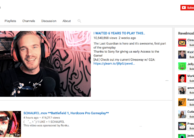Throughout the second half of the interview, Stewart sheds the satire and instead is quite serious with Cramer. This lengthy and severe diatribe signifies the climax of the interview, and it is from this point that the two men work back down to discussing the role that CNBC could play in the future and the responsibility that the network has to the public. Yet, from this point on, the tone of the interview changes drastically, with Stewart more aggressive, and Cramer on the defensive.
Stewart, throughout the interview with Cramer, represents a voice that is often lacking in the public spectrum. Nancy Snow’s comment for the Crossfire interview, “[he] said what so many Americans were thinking but were in no position to say,” could just as easily be applied to this situation. Between his CNBC criticism and his highlighting of the discrepancy between what Cramer says and does, Stewart exhibits quite a passion. Even with the high emotions associated with the subject, Stewart refrains from targeting much of his criticism unfairly at Cramer. Yet, the expert use of Cramer’s incriminating videos allows Stewart to address Cramer personally as well. Between his criticism of CNBC and of Cramer, Stewart challenges their responsibilities and admonishes the journalistic failings of both. The twenty-two and a half minute interview highlights Stewart’s desire to instill change in the national media process.
With such attention leading up to the interview, the aftermath of the interview did not disappoint in the resulting attention and discussion. There were many parallels drawn between Stewart’s appearance on
Crossfire and his interview with Cramer. Howard Kurtz, the host of
Reliable Sources on CNN, observes that Stewart expressed the same passion for holding the media accountable when he did on
Crossfire and affirms that Stewart is a “very trenchant media critic.”
Tucker Carlson, one of the former hosts of Crossfire, though, criticizes Stewart for being unfair and for accusing Cramer and CNBC of knowing that the financial sector was on the verge of “collapse,” but “pretended otherwise.” In addition, an ABC News synopsis of the interview erroneously claims that Stewart “[called] out Cramer and CNBC [for] not accurately predicting the financial meltdown.” Both Carlson and ABC News are incorrect. Stewart’s argument is not that Cramer and CNBC could have predicted the complete collapse of the market, as it is that they understand the manipulation that is occurring and are not calling out the CEOs and hedge fund managers for their unethical actions. CNBC has the potential ability and expertise to expose the lies and side bets that take place, yet chooses not to do so, which, according to Stewart, is its greatest sin.
Richard Cohen, a columnist for The Washington Post, defends CNBC and Cramer, claiming that there was little that they could have done and that they do not have any power to access the official financial documents of AIG and Bear Sterns. Nevertheless, the videos of Cramer on TheStreet.com are damning enough, and Stewart contends that they could have done a huge service to investors by publicizing these types of actions that had been and were being utilized. Cramer and CNBC would obviously not have foreseen or expected the financial meltdown specifically, but Stewart alleges persuasively that they acted in the opposite manner than they should have, given the information and access that they did have.
Furthermore, David Brancaccio, the host and editor of Now on PBS, stated that “[the interview with Cramer] marked an important moment in journalism, especially financial reporting.” Brancaccio further remarks about Stewart’s challenging approach: "It's really important that tough questions are asked, because when tough questions aren't asked, we end up with Enron… It's interesting that the tough questions came from Jon Stewart, brilliant comedian that he is." It seems that Stewart has applied the zeal from his Crossfire appearance to this interview and other Daily Show interviews. As will be analyzed at length in the next section, Stewart has made a point of conducting many of The Daily Show interviews in an engaging and thought-provoking manner, often addressing specific issues and contradictions rather than general themes or bland political discussions. Stewart, through The Daily Show interviews, essentially has set an example for how he would like other networks and serious political commentary programs to conduct their own interviews.
The last part of virtually every episode of The Daily Show with Jon Stewart consists of a guest interview. Typically, the guest interview consists of a five- to eight- minute discussion segment, ranging from current events and politics, to pop culture. While many of the guests are promoting a new movie or book, others are much more political. A Pew Research Study of the show, which analyzed the 136 different program guests in 2007, classified 41 as pop culture celebrities, 33 as politicians with “well-known political leanings,” and 57 as other journalists, authors, or experts with less obvious political views.
As it has evolved and gained more credibility and influence, The Daily Show has been able to attract very significant guests. Within the past few years, guests have included such celebrities as Tom Hanks, Jennifer Aniston, Jerry Seinfeld, Ben Stiller, Harrison Ford, and George Clooney, and such political and media figures as Tony Blair, King Abdullah II of Jordan, Michael Bloomberg, Bill O’Reilly, Fareed Zakaria, and Brian Williams. Presidential hopefuls Barack Obama, John McCain, Mike Huckabee, John Kerry, Newt Gingrich, and John Edwards have appeared on the program, and Presidents Barack Obama, Bill Clinton, and Jimmy Carter have appeared as well. Senator John Edwards made history in September 2003 by formally announcing his candidacy for president on The Daily Show, the first announcement of that kind for the program. In October 2010, President Obama made history by being the first sitting President to appear on the program.
While many interviews are light and comedic, a significant number of interviews are quite serious. While the focus of this section will be on the latter, it should be noted that the examples selected are not a representative sample of the type or quality of all the interviews. In general, however, when interviewing significant politicians and media figures, Stewart aims for a substantive conversation about political issues, controversial policies, or current events. As demonstrated by Stewart’s interview with Jim Cramer in the previous section, Stewart will often continue the conversation beyond the television airtime so that the remaining discussion can be viewed online. This particular technique conveys Stewart’s curiosity and goal of having a lengthy and thought-provoking discussion, whether it is with people with whom he agrees or disagrees. Regardless, the quality interviews improve the level of discourse and only lead to a more vibrant democracy. In this section, five interviews will be highlighted: Governor Mike Huckabee, former Speaker of the House Newt Gingrich, attorney John Yoo, author and political commentator Marc Thiessen, and President Barack Obama.
Former Arkansas Governor Mike Huckabee has appeared multiple times on The Daily Show. Huckabee, a pastor in his early life, ran for the Republican nomination for president in 2008, has written numerous books regarding political life and religion and hosts the show Huckabee on the Fox News network. Although he has often appeared on The Daily Show to promote a book of his, the conversation between Huckabee and Stewart is typically about significant political or social debates. Topics have ranged from fiscal concerns to issues such as abortion, same-sex marriage, and the 9/11 first responders health care bill. While Stewart and Huckabee have significantly different political backgrounds, the two almost always have interesting and highly philosophical discussions. In the following clip, Stewart and Huckabee debate the issue of same-sex marriage:
The Daily Show with Jon Stewart: Mike Huckabee Interview
Same-sex marriage is an issue about which many people argue very passionately, both in favor and against. Although both Stewart and Huckabee do feel strongly about their opinions on the issue, they are able to have a very honest and respectful dialogue without a shouting match taking place. Unlike in his interview with Cramer, Stewart makes no attempt to criticize Huckabee. There is no yelling, screaming, or, as Stewart would say, “partisan hackery,” in the discussion, even though the two represent and debate the major arguments used by both liberals and conservatives.
Based on Stewart’s critique of CNN’s Crossfire, it is likely that this Huckabee interview is very close to the quality of discourse Stewart would like to see on a “debate” show, presenting a more rational and reasonable approach to a significant moral controversy. Stewart and Huckabee completely disregard political epithets and routine talking points and, instead, genuinely discuss the issue – a relatively rare occurrence given the typical emotions that often surface on this topic. Even though there are instances of humor, the interview overall is quite serious and substantive.Continued on Next Page »
1.) Baym, Geoffrey. “The Daily Show: Discursive Integration and the Reinvention of Political Journalism.” Political Communication. 2005. 22: 3, 259-276.
Brewer, Paul R. and Emily Marquardt. “Mock News and Democracy: Analyzing The Daily Show.” Atlantic Journal of Communication. Lawrence Erlbaum Associates, Inc. 2007. 15:4, 249-267.
4.) “Remembering Anna.” The Daily Show with Jon Stewart. Comedy Central. February 12, 2007. Web. October 26, 2010. <http://www.thedailyshow.com/watch/mon-february-12-2007/remembering-anna>.
5.) “Shut Up Mark Sanford.” The Daily Show with Jon Stewart. Comedy Central. July 12, 2009. Web. October 26, 2010. <http://www.thedailyshow.com/watch/thu-july-2-2009/shut-up--mark-sanford>.
6.) “The Wedding of the Century of the Millennium.” The Daily Show with Jon Stewart. Comedy Central. August 2, 2010. Web. October 26, 2010. <http://www.thedailyshow.com/watch/mon-august-2-2010/wedding-of-the-decade-of-the-century-of-the-millennium >.
“Headlines Duke Lacrosse Rape Allegations.” The Daily Show with Jon Stewart. Comedy Central. April 18, 2006. Web. October 26, 2010. <http://www.thedailyshow.com/watch/tue-april-18-2006/headlines---duke-lacrosse-rape-allegations>.
9.) “Headlines Duke Lacrosse Rape Allegations.” The Daily Show with Jon Stewart. Comedy Central. April 18, 2006. Web. October 26, 2010. <http://www.thedailyshow.com/watch/tue-april-18-2006/headlines---duke-lacrosse-rape-allegations>.
10.) “Journalism, Satire or Just Laughs? ‘The Daily Show with Jon Stewart,’ Examined.” Pew Research Center’s Project for Excellence in Journalism. N.p., May 8, 2008. Web. October 26, 2010. <http://www.journalism.org/node/10953>.
11.) Who the f@#k is that guy? – Political Experts.” The Daily Show with Jon Stewart. Comedy Central. October 22, 2008. Web. October 28, 2010. <http://www.thedailyshow.com/watch/wed-october-22-2008/who-the-f--k-is-that-guy----political-experts>.
13.) “Hi Tech News Coverage.” The Daily Show with Jon Stewart. Comedy Central. January 9, 2008. Web. October 28, 2010. <http://www.thedailyshow.com/watch/wed-january-9-2008/hi-tech-news-coverage>.
14.) “Speech Therapy.” The Daily Show with Jon Stewart. Comedy Central. January 28, 2010. Web. November 4, 2010. <http://www.thedailyshow.com/watch/thu-january-28-2010/speech-therapy---post-racial>.
15.) “CNN Leaves It There.” The Daily Show with Jon Stewart. Comedy Central. October 12, 2009. Web. November 1, 2010. <http://www.thedailyshow.com/watch/mon-october-12-2009/cnn-leaves-it-there>.
17.) “CNN Leaves It There.” The Daily Show with Jon Stewart. Comedy Central. October 12, 2009. Web. November 1, 2010. <http://www.thedailyshow.com/watch/mon-october-12-2009/cnn-leaves-it-there>.
18.) “MSNBC Left Behind.” The Daily Show with Jon Stewart. Comedy Central. October 11, 2010. Web. November 3, 2010. <http://www.thedailyshow.com/watch/mon-october-11-2010/msnbc-left-behind>.
19.) “Keith Olbermann’s Name Calling.” The Daily Show with Jon Stewart. Comedy Central. January 21, 2010. Web. November 4, 2010. <http://www.thedailyshow.com/watch/thu-january-21-2010/special-comment---keith-olbermann-s-name-calling>.
20.) “Speech Therapy.” The Daily Show with Jon Stewart. Comedy Central. January 28, 2010. Web. November 4, 2010. <http://www.thedailyshow.com/watch/thu-january-28-2010/speech-therapy---post-racial>.
21.) “Fox News.Com.” Fox News Network, LLC. November 4, 2010. 2010. <http://www.foxnews.com/>.
22.) “For Fox Sake.” The Daily Show with Jon Stewart. Comedy Central. October 29, 2009. Web. November 4, 2010. <http://www.thedailyshow.com/watch/thu-october-29-2009/for-fox-sake->.
24.) “Anchor Management.” The Daily Show with Jon Stewart. Comedy Central. March 3, 2010. Web. November 4, 2010. <http://www.thedailyshow.com/watch/wed-march-3-2010/anchor-management>.
“Gretchen Carlson Dumbs Down.” The Daily Show with Jon Stewart. Comedy Central. December 8, 2009. Web. November 6, 2010. <http://www.thedailyshow.com/watch/tue-december-8-2009/gretchen-carlson-dumbs-down>.
“Sean Hannity Uses Glenn Beck’s Protest Footage.” The Daily Show with Jon Stewart. Comedy Central. November 10, 2009. Web. November 6, 2010. <http://www.thedailyshow.com/watch/tue-november-10-2009/sean-hannity-uses-glenn-beck-s-protest-footage>.
33.) “Sean Hannity Apologizes to Jon.” The Daily Show with Jon Stewart. Comedy Central. November 12, 2009. Web. July 16, 2011. <http://www.thedailyshow.com/watch/thu-november-12-2009/sean-hannity-apologizes-to-jon>.
34.) “Are You Ready For Some Midterms? – MSNBC’s Political Narrative.” The Daily Show with Jon Stewart. Comedy Central. September 9, 2010. Web. November 6, 2010. <http://www.thedailyshow.com/watch/thu-september-9-2010/are-you-ready-for-some-midterms----msnbc-s-political-narrative>.
35.) “Kurtz criticizes Hannity's "careful editing" of Obama speech: "Isn't that kind of editing, what's the word, deceptive?" Media Matters For America. September 12, 2010. Web. November 6, 2010. >.
36.) “Bernie Goldberg Fires Back.” The Daily Show with Jon Stewart. Comedy Central. April 20, 2010. Web. November 6, 2010. <http://www.thedailyshow.com/watch/tue-april-20-2010/bernie-goldberg-fires-back>.
37.) “Top TV Feuds: Jon Stewart vs. Crossfire.” TIME. Time.com. 2010. <http://www.time.com/time/specials/packages/article/0,28804,1884499_1884515_1884462,00.html>.
Gollmitzer, Mirjam. "Towards a Media Incidents Theory: How "Adversarial Guests" Ruin Programs and Liberate the Audience."Conference Papers -- International Communication Association(2009): 1-20. Communication & Mass Media Complete. EBSCO. Web. 20 Nov. 2010.
44.) Douthat, Ross. “Can CNN Be Saved?” The New York Times. April 4, 2010. <http://www.nytimes.com/2010/04/05/opinion/05douthat.html>.
Snow, Nancy. “Jon Stewart: Still the Most Trusted Newscaster in America.” The Huffington Post. July 23, 2009. <http://www.huffingtonpost.com/nancy-snow/jon-stewart-still-the-mos_b_243646.html>.
47.) Gollmitzer, Mirjam. "Towards a Media Incidents Theory: How "Adversarial Guests" Ruin Programs and Liberate the Audience."Conference Papers -- International Communication Association(2009): 1-20.Communication & Mass Media Complete. EBSCO. Web. 20 Nov. 2010.
“CNBC Financial Advice.” The Daily Show with Jon Stewart. Comedy Central. March 4, 2009. Web. November 20, 2010. <http://www.thedailyshow.com/watch/wed-march-4-2009/cnbc-financial-advice>.
52.) Cramer, Jim. “Cramer Takes on White House, Frank Rich, and Jon Stewart.” The Street. MainStreet.com. March 10, 2009. <http://www.mainstreet.com/article/moneyinvesting/news/cramer-takes-white-house-frank-rich-and-jon-stewart?page=4>.
“In Cramer We Trust.” The Daily Show with Jon Stewart. Comedy Central. March 9, 2009. Web. November 20, 2010. <http://www.thedailyshow.com/watch/mon-march-9-2009/in-cramer-we-trust>.
“Basic Cable Personality Clash Skirmish.” The Daily Show with Jon Stewart. Comedy Central. March 10, 2009. Web. November 20, 2010. <http://www.thedailyshow.com/watch/tue-march-10-2009/basic-cable-personality-clash-skirmish--09>.
“Jim Cramer Extended Interview Pt. 1.” The Daily Show with Jon Stewart. Comedy Central. March 12, 2009. Web. November 21, 2010. <http://www.thedailyshow.com/watch/thu-march-12-2009/jim-cramer-extended-interview-pt--1>.
“Jim Cramer Extended Interview Pt. 2.” The Daily Show with Jon Stewart. Comedy Central. March 12, 2009. Web. November 21, 2010. <http://www.thedailyshow.com/watch/thu-march-12-2009/jim-cramer-extended-interview-pt--2>.
“Jim Cramer Extended Interview Pt. 3.” The Daily Show with Jon Stewart. Comedy Central. March 12, 2009. Web. November 21, 2010. <http://www.thedailyshow.com/watch/thu-march-12-2009/jim-cramer-extended-interview-pt--3>.
64.) Snow, Nancy. “Jon Stewart: Still the Most Trusted Newscaster in America.” The Huffington Post. July 23, 2009. <http://www.huffingtonpost.com/nancy-snow/jon-stewart-still-the-mos_b_243646.html>.
65.) France, Lisa Respers. “Stewart seen as winner in Showdown with Cramer.” March 19, 2009. CNN.com. 2009. <http://www.cnn.com/2009/SHOWBIZ/TV/03/13/cramer.stewart.reaction/index.html?iref=allsearch>.
66.) Carlson, Tucker. “How Jon Stewart Went Bad.” The Daily Beast: Blogs & Stories. March 18, 2009. RTST, Inc. 2010. <http://www.thedailybeast.com/blogs-and-stories/2009-03-18/how-jon-stewart-went-bad/>.
67.) Fisher, Luchina. “Jon Stewart Wins Cramer Showdown.” March 13, 2009. ABC News Internet Ventures. 2010. <http://abcnews.go.com/Entertainment/Television/story?id=7075368&page=1>.
68.) Cohen, Richard. “Don’t Blame Jim Cramer.” The Washington Post. March 17, 2009. <http://www.washingtonpost.com/wpdyn/content/article/2009/03/16/AR2009031602319.html>.
France, Lisa Respers. “Stewart seen as winner in Showdown with Cramer.” March 19, 2009. CNN.com. <http://www.cnn.com/2009/SHOWBIZ/TV/03/13/cramer.stewart.reaction/index.html?iref=allsearch>.
“Journalism, Satire or Just Laughs? ‘The Daily Show with Jon Stewart,’ Examined.” Pew Research Center’s Project for Excellence in Journalism. N.p., May 8, 2008. Web. October 26, 2010. <http://www.journalism.org/node/10953>.
72.) “Mike Huckabee Pt.2.” The Daily Show with Jon Stewart. Comedy Central. December 9, 2008. Web. April 21, 2011. <http://www.thedailyshow.com/watch/tue-december-9-2008/mike-huckabee-pt--2>.
“Newt Gingrich.” The Daily Show with Jon Stewart. Comedy Central. February 9, 2010. Web. April 21, 2011. <http://www.thedailyshow.com/watch/tue-february-9-2010/newt-gingrich>.
“Exclusive John Yoo Extended Interview Pt.1.” The Daily Show with Jon Stewart. Comedy Central. January 11, 2010. Web. April 21, 2011. <http://www.thedailyshow.com/watch/mon-january-11-2010/exclusive---john-yoo-extended-interview-pt--1>.
77.) “Exclusive Marc Thiessen Extended Interview Pt.1.” The Daily Show with Jon Stewart. Comedy Central. March 9, 2010. Web. April 21, 2011. <http://www.thedailyshow.com/watch/tue-march-9-2010/exclusive---marc-thiessen-extended-interview-pt--1>.
78.) Douthat, Ross. “Can CNN Be Saved?” The New York Times. April 4, 2010. <http://www.nytimes.com/2010/04/05/opinion/05douthat.html>.
79.) “Exclusive John Yoo Extended Interview Pt.3.” The Daily Show with Jon Stewart. Comedy Central. January 11, 2010. Web. April 21, 2011. <http://www.thedailyshow.com/watch/mon-january-11-2010/exclusive---john-yoo-extended-interview-pt--3>.
80.) “Barack Obama Pt.1.” The Daily Show with Jon Stewart. Comedy Central. October 27, 2010. Web. April 30, 2011. <http://www.thedailyshow.com/watch/wed-october-27-2010/barack-obama-pt--1>.
81.) “Eye to Eye: Obama on Stewart (CBS News).” CBS News. YouTube. August 23, 2007. <http://www.youtube.com/watch?v=6f3nQPJfgPo&feature=fvw>.
“Journalism, Satire or Just Laughs? ‘The Daily Show with Jon Stewart,’ Examined.” Pew Research Center’s Project for Excellence in Journalism. N.p., May 8, 2008. Web. October 26, 2010. <http://www.journalism.org/node/10953>.
84.) Douthat, Ross. “Can CNN Be Saved?” The New York Times. April 4, 2010. <http://www.nytimes.com/2010/04/05/opinion/05douthat.html>.
85.) Baym, Geoffrey. “The Daily Show: Discursive Integration and the Reinvention of Political Journalism.” Political Communication. 2005. 22: 3, 259-276.
86.) “So You Think You Can Douche.” The Daily Show with Jon Stewart. Comedy Central. July 29, 2009. Web. April 30, 2011. <http://www.thedailyshow.com/watch/wed-july-29-2009/so-you-think-you-can-douche>.
87.) “Sarah Palin Gender Card.” The Daily Show with Jon Stewart. Comedy Central. September 3, 2008. Web. April 30, 2011. <http://www.thedailyshow.com/watch/wed-september-3-2008/sarah-palin-gender-card>.
88.) “Sarah Palin Gender Card.” The Daily Show with Jon Stewart. Comedy Central. September 3, 2008. Web. April 30, 2011. <http://www.thedailyshow.com/watch/wed-september-3-2008/sarah-palin-gender-card>.
89.) “Postcards From the Pledge.” The Daily Show with Jon Stewart. Comedy Central. September 23, 2010. Web. April 30, 2011. <http://www.thedailyshow.com/watch/thu-september-23-2010/postcards-from-the-pledge>.
90.) “Postcards From the Pledge.” The Daily Show with Jon Stewart. Comedy Central. September 23, 2010. Web. April 30, 2011. <http://www.thedailyshow.com/watch/thu-september-23-2010/postcards-from-the-pledge>.
“Moral Kombat.” The Daily Show with Jon Stewart. Comedy Central. May 14, 2009. Web. April 30, 2011. <http://www.thedailyshow.com/watch/thu-may-14-2009/moral-kombat>.
93.) Shear, Michael. “From Jon Stewart, Echoes of G.O.P. Past.” The New York Times. September 24, 2010. <http://thecaucus.blogs.nytimes.com/2010/09/24/from-jon-stewart-echoes-of-g-o-p-past/?scp=1&sq=jon%20stewart%20postcards%20from%20the%20pledge&st=cse>.
94.) Gore, Al. The Assault on Reason. Penguin Books. New York, NY. 2007. 111.
95.) “I Give Up – 9/11 Responders.” The Daily Show with Jon Stewart. Comedy Central. August 4, 2010. Web. April 30, 2011. <http://www.thedailyshow.com/watch/wed-august-4-2010/i-give-up---9-11-responders-bill>.
96.) “Republicans Block 9/11 Health Care Bill.” The Daily Show with Jon Stewart. Comedy Central. December 9, 2010. Web. April 30, 2011. <http://www.thedailyshow.com/watch/thu-december-9-2010/republicans-block-9-11-health-care-bill>.
97.) “Worst Responders.” The Daily Show with Jon Stewart. Comedy Central. December 16, 2010. Web. April 30, 2011. <http://www.thedailyshow.com/watch/thu-december-16-2010/worst-responders>.
98.) “9/11 First Responders React to the Senate Filibuster.” The Daily Show with Jon Stewart. Comedy Central. December 16, 2010. Web. April 30, 2011. <http://www.thedailyshow.com/watch/thu-december-16-2010/9-11-first-responders-react-to-the-senate-filibuster>.
99.) “Exclusive – Mike Huckabee Extended Interview.” The Daily Show with Jon Stewart. Comedy Central. December 16, 2010. Web. April 30, 2011. <http://www.thedailyshow.com/watch/thu-december-16-2010/exclusive---mike-huckabee-extended-interview>.
100.) Newton-Small, Jay. “Did Jon Stewart Turn the Tide on the 911 First Responders Bill?” TIME: Swampland. December 20, 2010. Time, Inc. 2011. <http://swampland.blogs.time.com/2010/12/20/did-jon-stewart-turn-the-tide-on-the-911-first-responders-bill/>.
101.) “New Hope for 9/11 Heroes.” FOX NEWS. Fox News Network, LLC. December 20, 2010. <http://video.foxnews.com/v/4469087/new-hope-for-911-heroes>.
102.) Hernandez, Raymond. “Senate Passes 9/11 Health Bill as Republicans Back Down.” The New York Times. December 22, 2010. <http://www.nytimes.com/2010/12/23/nyregion/23health.html?_r=1>.
103.) Madison, Lucy. “White House Lauds Jon Stewart for Pushing Passage of 9/11 Health Bill.” CBS News.com. Political Hotsheet. December 21, 2010. <http://www.cbsnews.com/8301-503544_162-20026333-503544.html>.
Carter, Bill and Brian Stelter. “In ‘Daily Show’ Role on 9/11 Bill, Echoes of Murrow.” The New York Times. December 26, 2010. <http://www.nytimes.com/2010/12/27/business/media/27stewart.html?pagewanted=1&_r=1>.
“Kirsten Gillibrand.” The Daily Show with Jon Stewart. Comedy Central. January 4, 2011. Web. April 30, 2011. <http://www.thedailyshow.com/watch/tue-january-4-2011/kirsten-gillibrand>.
Baym, Geoffrey. “The Daily Show: Discursive Integration and the Reinvention of Political Journalism.” Political Communication. 2005. 22: 3, 259-276.
110.) Stelter, Brian. “In Visit to Fox News, Jon Stewart Faults Fox News.” The New York Times. February 5, 2010. <http://www.nytimes.com/2010/02/06/arts/television/06fox.html?scp=2&sq=jon%20stewart&st=cse>.
111.) “Entire Jon Stewart Interview.” FOX NEWS. Fox News Network, LLC. February 4, 2010. <http://video.foxnews.com/v/4003531/entire-jon-stewart-interview/>.

















